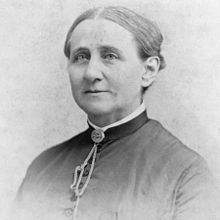BLACKWELL, ANTOINETTE LOUISA BROWN

(20 May 1825, Henrietta, NY -5 November 1921, Elizabeth, NJ). Education: Graduated from Oberlin College, 1847; studied religion at Oberlin, but denied an advanced degree because of her sex-belatedly awarded honorary M.A., 1878, and honorary D.O., 1908. Career: Guest preacher in many pulpits and lecturer on women's rights, antislavery movement, and temperance, 1850-53; minister, First Congregational Church, Butler and Savannah, Wayne County, NY, 1853-54; housewife and mother; lecturer, author, and social activist; founder and pastor emeritus, All Souls Unitarian Church, Elizabeth, NJ, 1908-21.
Antoinette Blackwell was the first American woman to serve as minister in a major denomination. Raised in the "Burnt-Over District" of upstate New York, the home of many religious innovations, she made a public confession of faith at age nine and became a full member of the Congregational Church. She attended a local academy, taking substantially the same courses as the boys. With parental support she attended Oberlin, the first American college to admit women.
Blackwell ran into resistance from her formerly supportive parents, however, when she decided to study for an advanced degree at Oberlin and become a minister. Even Oberlin balked at the idea of a young woman aiming so high. "Masculine headship everywhere was held to be indispensable to morality,"
Blackwell later remarked. Oberlin finally agreed to admit her, but although she completed the same course as the men, they denied her the license to preach and the divinity degree her male colleagues received. None the less, Blackwell was invited to preach and became minister over a Congregational church in Wayne County, New York.
One wonders how she would have fared as a minister, had she remained in the pulpit for the next half century of her active life. But she withdrew from the ministry the next year, having persuaded herself that the Unitarian faith was more compatible with her own beliefs. She sought a clerical position among the Unitarians, but was never called to the ministry. As a writer, lecturer, and social reformer, however, she was active for many decades, and at the age of ninety-five in 1920 she voted in the first American presidential election after the passage of the Woman Suffrage Amendment.
Blackwell's short career as a Congregationalist minister indicates the flexibility available in a church in which an individual congregation is given considerable latitude in choosing a pastor. Her decision to become a Unitarian suggests how porous the denominational boundaries were a few decades after the most "liberal" Congregationalists decided to create the Unitarian church. And her inability to secure a second pulpit indicates that women were generally denied the opportunity to the ministry until well into the twentieth century.
Bibliography
A: The Sexes Throughout Nature (New York, 1875); The Physical Basis of Immortality (New York, 1876); The Social Side of Mind and Action (New York, 1915); Carol Lasser and Marlene Deahl Merrill, eds., Letters between Lucy Stone and Antoinette Brown Blackwell, 1846-93 (Champaign-Urbana, IL, 1987).
B: DAB 2, 319-20; NAW 1, 158-61; NCAB 29, 129; Elinor Rice Hays, Those Extraordinary Blackwells (New York, 1967); Laura Kerr, Lady in the Pulpit (New York, 1951); Elizabeth Cazden, Antoinette Brown Blackwell: A Biography (Old Westbury, NY, 1983).
Antoinette Blackwell was the first American woman to serve as minister in a major denomination. Raised in the "Burnt-Over District" of upstate New York, the home of many religious innovations, she made a public confession of faith at age nine and became a full member of the Congregational Church. She attended a local academy, taking substantially the same courses as the boys. With parental support she attended Oberlin, the first American college to admit women.
Blackwell ran into resistance from her formerly supportive parents, however, when she decided to study for an advanced degree at Oberlin and become a minister. Even Oberlin balked at the idea of a young woman aiming so high. "Masculine headship everywhere was held to be indispensable to morality,"
Blackwell later remarked. Oberlin finally agreed to admit her, but although she completed the same course as the men, they denied her the license to preach and the divinity degree her male colleagues received. None the less, Blackwell was invited to preach and became minister over a Congregational church in Wayne County, New York.
One wonders how she would have fared as a minister, had she remained in the pulpit for the next half century of her active life. But she withdrew from the ministry the next year, having persuaded herself that the Unitarian faith was more compatible with her own beliefs. She sought a clerical position among the Unitarians, but was never called to the ministry. As a writer, lecturer, and social reformer, however, she was active for many decades, and at the age of ninety-five in 1920 she voted in the first American presidential election after the passage of the Woman Suffrage Amendment.
Blackwell's short career as a Congregationalist minister indicates the flexibility available in a church in which an individual congregation is given considerable latitude in choosing a pastor. Her decision to become a Unitarian suggests how porous the denominational boundaries were a few decades after the most "liberal" Congregationalists decided to create the Unitarian church. And her inability to secure a second pulpit indicates that women were generally denied the opportunity to the ministry until well into the twentieth century.
Bibliography
A: The Sexes Throughout Nature (New York, 1875); The Physical Basis of Immortality (New York, 1876); The Social Side of Mind and Action (New York, 1915); Carol Lasser and Marlene Deahl Merrill, eds., Letters between Lucy Stone and Antoinette Brown Blackwell, 1846-93 (Champaign-Urbana, IL, 1987).
B: DAB 2, 319-20; NAW 1, 158-61; NCAB 29, 129; Elinor Rice Hays, Those Extraordinary Blackwells (New York, 1967); Laura Kerr, Lady in the Pulpit (New York, 1951); Elizabeth Cazden, Antoinette Brown Blackwell: A Biography (Old Westbury, NY, 1983).
